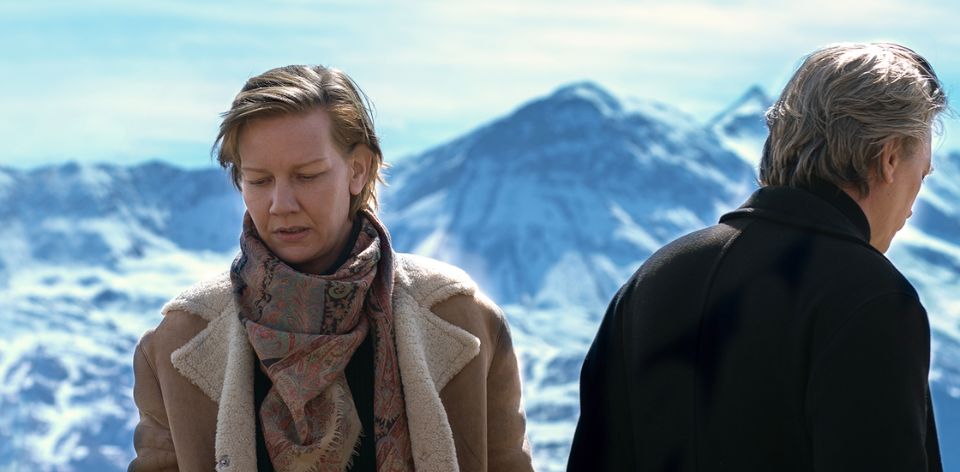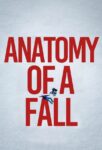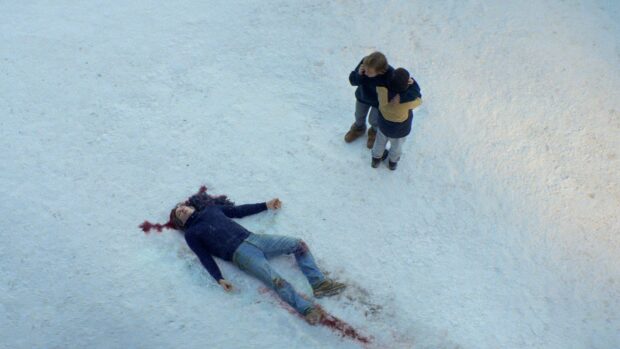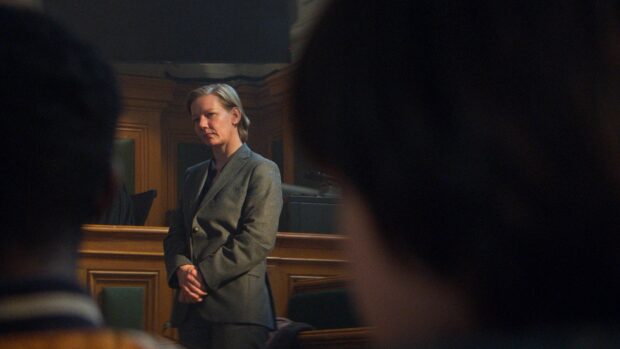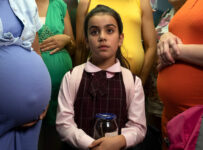In recent years, the Palme d’Or has been awarded to a Korean thriller that touched on colonialism and imperialism, a satirical black comedy about a celebrity couple on a cruise, and a body horror film where someone has sex with a car. So, on the surface, the courtroom dramatics of Justine Triet’s ANATOMY OF A FALL (Anatomie d’une chute) seem like lightweight material in comparison.
Yet there’s a lot more going on in Triet and Arthur Harari’s screenplay than a first glance might suggest. It begins with an overlapping cacophony of noise, as a reporter attempts to interview German writer Sandra (Sandra Hüller) in her cabin in the remote French Alps. Her unseen husband Samuel (Samuel Theis) plays loud music, making it impossible for the recording to continue. In some ways, the rest of the film spends its time unpacking the meaning of these clashing soundscapes.
Sometime later, their visually impaired son Daniel (Milo Machado-Graner) is taking their dog for a walk. When he returns, he finds his father’s body dead in the snow outside their house. With the police suspecting foul play, Sandra is arrested. Yet in the ensuing trial, doubt is cast by her defence lawyer Vincent (Swann Arlaud) as to Samuel’s mental state, while the prosecution (Antoine Reinartz) unearths evidence of arguments to paint Sandra as a monster.
On the surface, ANATOMY OF A FALL is about a literal physical fall. The investigation and courtroom scenarios ensure that we remember that. There’s reconstructions, deconstructions, and reenactments a plenty. At one point, we literally watch a crash dummy repeatedly drop onto the scene of the alleged crime. Yet it’s about other falls too. The private emotional fall of a person and the consequential public fall(out).
One can never know what goes on in a relationship from the outside. What Triet and Harari demonstrate is that even under an intense microscope, only fragments can truly be glimpsed. This is where the central tension of the film lies, in exploring the subjectivity of memory, and as new information is provided our allegiances might falter and shift.
Case in point is a courtroom scene that stylistically flips that opening sequence. The prosecution present a recording of an argument from the day before Samuel’s death. Instead of us trying to hear over the top of loud music, the deadly silent courtroom amplifies the words being spoken (or yelled). Both the court and the film’s audience attempt to discern what is happening from the sounds alone, and the effect can be quite chilling. It will unquestionably be a point where many viewers make up their minds.
Hüller is magnificent, navigating this space in a mixture of English, French, and occasionally her native German. Language plays an important role, in fact, as it often serves as a barrier to the character of Sandra, trying to defend herself in the language of her deceased husband. If there’s any justice during this year’s awards season, all of the things will go to Hüller.
Even at the end, ANATOMY OF A FALL doesn’t give us a convenient resolution, the kind that television courtroom dramas have taught us to expect. Yes, there is an outcome to the trial, but by now we’ve learned that the truth can simply be a decision that one makes. Sure to linger with you long after the credits roll, here is a film worth revisiting more than once, as some mysteries remain even after they are solved.
2023 | France | DIRECTOR: Justine Triet | WRITER: Justine Triet, Arthur Harari | CAST: Sandra Hüller, Swann Arlaud, Milo Machado-Graner, Antoine Reinartz | DISTRIBUTOR: Sydney Film Festival 2023 | RUNNING TIME: 150 minutes | RELEASE DATE: 7-18 June 2023 (SFF 2023)

